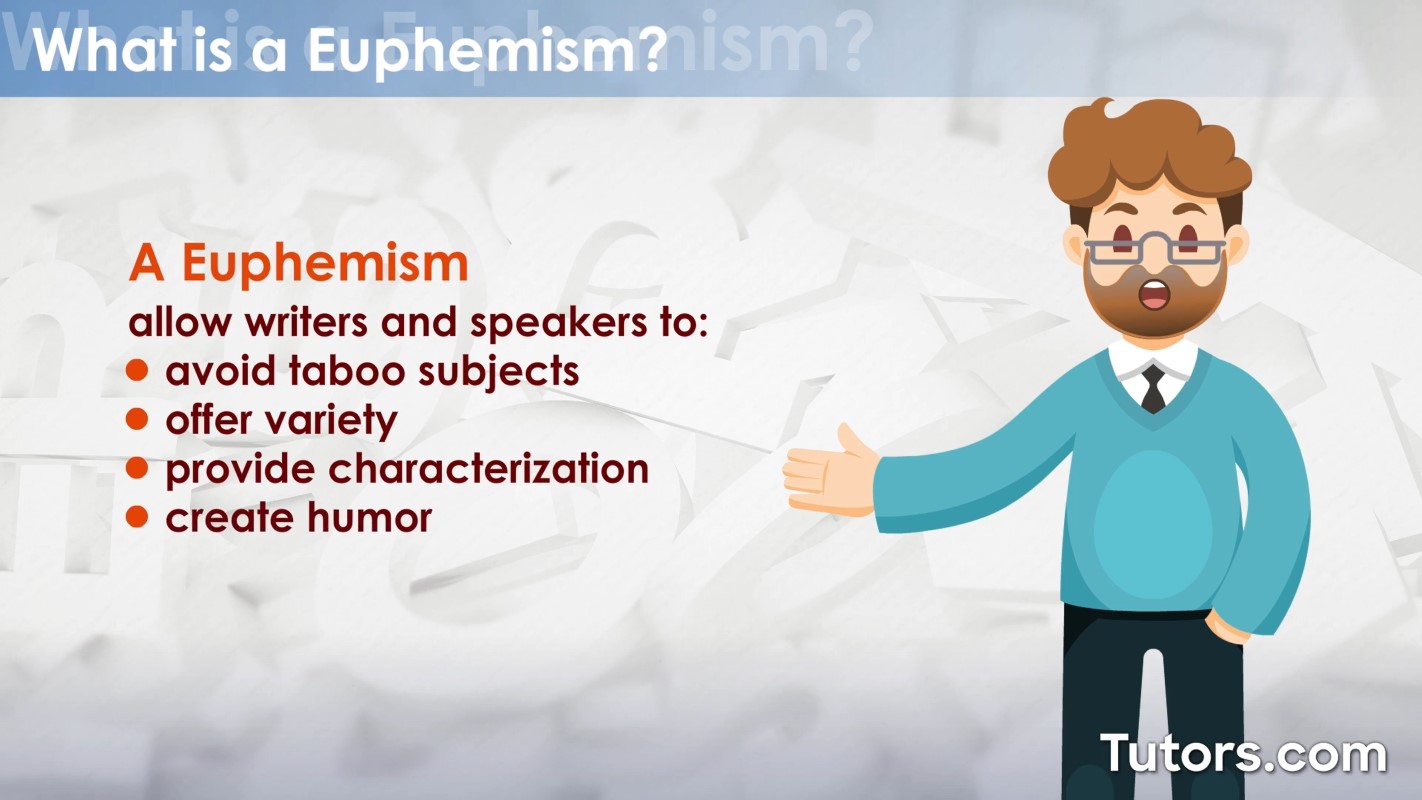Euphemism — Definition and Examples
What is a euphemism?
A euphemism is a courteous and respectful word or phrase that replaces an offensive or impolite statement. For example, the word "basic" has become a euphemism for "unoriginal". Euphemisms help writers and speakers avoid taboo subjects, offer variety, provide characterization, and create humor.
Avoid taboo subjects: The main role of a euphemism is to avoid words and/or phrases that are considered too offensive or displeasing. They allow a writer or speaker to present the same idea using less offensive language without the disrespectful connotation.
The dog didn't die; he went to a "farm upstate."
People don't go to prison; they go to a "correctional facility."
Offer variety: Euphemisms allow writers and speakers to present the same idea with new words to avoid repetition.

Provide characterization: Euphemisms can provide insight into the personality of a character. It suggests they want to avoid discussing things that are unpleasant or insensitive. Those who do not use them are more direct and are willing to discuss ideas that others might find uncomfortable.
Create humor: Using euphemisms ironically can have a comedic effect. Their use may provide a moment of levity that undercuts the harshness or appropriateness of the word or phrase.
When using euphemisms, authors typically incorporate them in the following ways:
Abstract: Disguise unpleasant realities
Litotes: Also known as an understatement, litotes diminish the intensity of something.
Modification: Changing an offensive noun to an adjective

Slang: Slang words work as euphemisms to either increase or decrease the intensity of the actual word or phrase.
The etymology of the English word euphemism is from Latin euphēmismus and Greek euphēmismós, meaning “words of good omen.”
The antonym of euphemism is dysphemism, a derogatory word or phrase used instead of one that isn’t inherently impolite (e.g., “boondocks” instead of “rural area”).
Euphemism examples
The following word lists categorize common examples of euphemisms in American English:
Death/Violence
| Euphemism | Offensive/Impolite Expression |
|---|---|
| put to sleep | euthanize |
| the departed | person who died |
| neutralize | kill |
| pacify | destroy |
| meet your maker | die |
| collateral damage | inadvertent casualties/destruction |
Employment
| Euphemism | Offensive/Impolite Expression |
|---|---|
| let go | fired |
| between jobs | unemployed |
| furlough | laid off |
| out-source | send work overseas |
| considering your options | unable to find a job |
Financial
| Euphemism | Offensive/Impolite Expression |
|---|---|
| economically challenged | poor |
| cook the books | change accounting information |
| economical | cheap |
| paid off | bribed |
| thrifty | stingy with money |
Bodily Functions and Aging
| Euphemism | Offensive/Impolite Expression |
|---|---|
| under the weather | sick |
| the sniffles | has a cold |
| tossed their cookies | threw up |
| over the hill | past one's prime |
| senior citizen | old |
Characteristics and Attributes
| Euphemism | Offensive/Impolite Expression |
|---|---|
| vertically challenged | short |
| a little thin on the top | bald |
| enhanced interrogation | torture |
| big-boned | overweight |
| pre-owned | used |
Authors also incorporate euphemistic language in their works, as illustrated by the following example sentences:
Animal Farm by George Orwell:
"For the time being, certainly, it had been found necessary to make a readjustment of rations."
Orwell uses readjustment instead of reduction as a euphemism.
Hamlet by William Shakespeare:
"For in that sleep of death what dreams may come / When we have shuffled off this mortal coil, / Must give us pause: there's the respect / That makes calamity of so long life."
Shakespeare uses "shuffled off this mortal coil" as a euphemism for death.
"Afterwards" by Tom Hardy:
"If I pass during some nocturnal blackness, mothy and warm, / When the hedgehog travels furtively over the lawn, / One may say, "He strove that such innocent creatures should come to no harm, / But he could do little for them; and now he is gone."
Hardy uses the phrase "if I pass during some nocturnal blackness" as a euphemism for dying in his sleep.